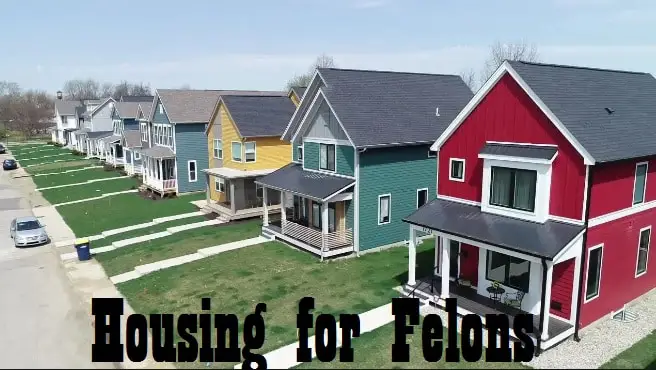Housing is a common problem among felons. Felony convicts are always on the search for suitable housing schemes. Among other housing schemes, the Section 8 Voucher seems to be the most popular.
What is a Section 8 Voucher?
Also referred to as the Housing Choice Voucher Program (source), section 8 Voucher is a rental assistance scheme present across all states in the US. The federally funded program provides a discounted rental package for eligible persons – or families. The plan allows participating landlords to offer their homes to felons at up to 60% to 70% discount.
This program usually comes with strict eligibility guidelines. These regulations consider persons with a criminal history ineligible. Although these strict criteria make it difficult for felons to secure a Section 8 voucher, in the long run, this may turn out the best option for your housing problems.
As you read on, you will discover how the scheme works– from eligibility guidelines, application procedures, processing duration, and everything in-between.
Recommended: housing grants for convicted felons
Are Felons Eligible for Section 8 Housing?

Federal Regulations automatically disqualify two classes of felonies from the federal government-subsidized housing scheme. They include:
- Persons with any record of production of meth (methamphetamine) in federal housing.
- Persons with a life-long subscription to the sex offender registry.
These rules do not only ruin an individual’s Section 8 eligibility status – it destroys the chances of the entire family.
Besides federal guidelines, each state has its independent eligibility regulations that may further reduce the hope of felons.
Since the early 90s, many strict guidelines have emerged from different states and federal housing bodies. These rules are in a bid to curb crime rates among residents in low-budget housing.
These regulations have, over the years, posed as a significant housing barrier for many ex-convicts.
HUD Guidelines For Felons
Here are some rules of the Department of Housing and Urban Development (HUD) that determine whether or not felony convicts are qualified for public housing benefits.
- Felony must exceed five years. For Francisco Housing Authority, a ten-year felony is required.
There’s an exception though – the authorities may accept your application before the fifth year, after a successful rehabilitation program, and have obtained a compliance certificate.
Here are conditions that can disqualify you from section 8 benefits. Record(s) of conviction for:
- Specific fraud cases
- Violent crimes
- Drug trafficking
If any of these records appear on your criminal history, visit your local PHA office or call to confirm your eligibility status.
- Any member of the family with a record of alcohol and drug abuse.
- Individual – or family – records of broken relationships with fellow residents in your former neighborhoods. Such poor relationships could include bullying, fighting, breach of peace, verbal assault – among others.
- Records of reoccurring default on your rental fee payment. It is noteworthy that persons -specifically low-income earners – who have maintained at least 50% payment over time but unable to make a full payment – may also qualify for the housing scheme.
Visit your local housing authority to find out the specific eligibility guidelines applicable to your area before you begin your application.
Application Procedures

Here’s a tip – send applications to several local housing schemes. The more you submit, the higher your chances. Sometimes, the waiting list may be closed for applications.
Find out when the list will be up for application again and apply it when it does.
Typically, the application process requires loads of paperwork and documents.
However, the authority will run a thorough criminal background check. If you have a stain on your criminal record, no use lying about your status on the application – you would be caught, most likely.
Here are relevant documents you may be required to submit with your application. Noteworthy – this list may slightly vary among programs, checkup HUD application guidelines.
- Standard Application – Get this from your state housing Authority website or visit a HUD office around you.
- Citizenship proof/Legal status
- Bank statements
- Birth Certificates
- Tax forms
- Current residency proof
- Credit score check
- Social security number
- Criminal background check
- At least three-month Pay stubs – some localities require up to six months or more.
- Proof of government benefits like food stamps and warfare payments.
- All your residential addresses for the past five years.
We recommend that you give accurate and fair responses to every query. Resist the temptation to leave out a neighbor you had regular scuffles with at your former residence. Leaving out some details, if found, may render you ineligible.
It is needful to check out the application deadline and complete your application early enough to avoid missing the deadline. After the listing closes, it may take up to between 6 to 12 months before it reopens.
Following a successful application, you may have to take a separate interview with staff at the housing authority. Here, you have an opportunity to present your case and sound convincing enough that you will make a good tenant and not breach any term stipulated in the guidelines.
You should also admit to be a felon and relate the conscious efforts you’ve made so far to become a law-abiding citizen.
Your local Housing Authority may go as far as contacting your past landlords to confirm your claims while in their houses. You may increase your chances by referencing previous landlords you trust would make kind remarks about you.
For the paperwork, do well to make photocopies of your application and all submitted documents. You may also decide to keep a log of the place you applied, the time of application, follow-up calls, etc.
There are cases where the agencies may misplace your submitted paperwork. Keeping records will help you produce the copies fast if such ever occurs.
Section 8 Criminal Background Check
If you wish to apply for section 8 housing, get ready for a compulsory criminal background check. This process seeks to validate your criminal status and uncover any misdemeanor and felonies on your criminal records. The PHA has the power to decline or terminate your application – based on the result of the check.
Besides the primary applicants, all members of the family seeking the section 8 voucher will undertake a criminal background check. According to PHA, this thorough vetting aims to ensure successful applicants do not pose any form of unrest or threat to residents of public housings.
Also, landlords may carry out their independent investigation on prospective section 8 tenants who wish to rent a house.
Can Persons Without Income Get Section 8 Voucher?
Most ex-convicts have another common problem – getting legal employment. Interestingly, you can still qualify for the Section 8 voucher even without a job or a source of livelihood.
However, you might be wondering: Can Section 8 find out if you’re working? Yes, they do. They have mechanisms in place to verify the employment status of applicants and beneficiaries.
According to HUD regulations, the applicant’s income must be below 50% of the median earnings in your locality. Also, if any member of your family is a felony ex-con and without earnings, your application might still be accepted and granted.
How to Increase Your Chances of Section 8 Voucher
After confirming your eligibility, here are some conditions that may help increase your chances of a Section 8 Voucher. These factors not only give your application higher priority but also reduces your wait time to as short as a month – or two.
Your application may get prioritized if;
- You presently live on the street or in a shelter
- Your current home is damaged
- Critical and urgent medical concerns
- You reside in the locality
- You spend above 50% of total income on rent
- Experiencing domestic violence
- Evicted for no fault of yours
Can a Person – or family- On Section 8 Accommodate a Felon?
What happens when a member of a family is a felon? Will this affect their application?
In this case, the same rule that applies to a felony convict who is the actual applicant would apply here too. Dealers of methamphetamine drugs and registered sex offenders have an automatic life ban from public housing schemes. Other forms of conviction may be considered for review by local PHAs, based on the gravity of the crime committed.
That said, where a felony convict wants to squat with someone who already stays in Section 8 housing arrangement, or if a Section 8 tenant is getting married to a felon, the original tenant should, by law, relate this development to their local PHA.
The authority reserves the right – based on the above criteria – to allow or deny such felon permission to live with the Section 8 tenant. Understanding the Section 8 rules on getting married to a felon is crucial as it significantly impacts the living arrangements and the eligibility of continuing in the Section 8 housing scheme.
Where the original section 8 recipient fails to report a felon co-tenant, the authority may reverse your authorization and terminate all benefits. Most times, this single act leads to permanent termination of public housing access –for life.
Housing an Unauthorized Guest
Section 8 regulations have made adequate provision for cases where a felony-convict family member or friend wants you to accommodate them for a brief period. Failure to abide by these rules may affect your subsidized housing arrangement. See what the guideline says:
You must first report to your landlord and the housing authority, that your guest is a felony convict. In some cases, based on their criminal charges – may be granted a stay permit. Anything contrary may be treated as fraud.
However, where a felon is permitted to stay with you, the permit is valid for only 14 consecutive days. Reports of any extension of stay may cost you your voucher.
What is the Average Duration of the Application Process?
The number of people that apply for subsidized housing usually leads to a long wait, particularly in big cities. Section 8 wait timeframe in such large cities can linger for as long as between two to four years. In less populated localities, applicants may wait for between 6 to 12 months.
Applicants should do a routine check – say, once in 2 months. This helps you monitor your spot on the active list, and ensure you are progressing on the list.
If you stay in cities with high competition, you may want to relocate to an area with less competition.
So, here’s the trick to reduce your wait time –apply in smaller, less competitive towns. However, you may have to think of family, job, and related factors before you proceed.
How Does Section 8 Housing Voucher Work?
It’s simple – as soon as you get the housing voucher, begin your search for an apartment owned by a participating section 8 landlord.
Your landlord will run an interview before they accept you. Besides PHAs check, the landlords will investigate your criminal background.
Of course, they will most likely ask for references.
That said, the voucher allows you to pay 30% of your monthly earnings for rent – the government pays whatever is left – directly to your landlord
You will sign a one-year lease with the landlord.
If you decide to move – and still have your voucher intact – you can use it again at your new apartment.
How to Get Assistance for Your Housing Search and Application?
Sometimes, searching and application procedures for section 8 vouchers can be a whole lot daunting – and complicated. Thankfully, you may seek support from these places –
- Community Action Programs (CAPs) and local search agencies are the first places to look. Their staff will assist you in the search for a suitable housing scheme, and may also help you handle the application processes.
- Housing Consumer Education Centre (HCEC) is another nice place to look in. As with CAPs, they do not only help you search; they may also help you fill out your application.
Lastly, if your family is currently homeless – or is threatened to be – visit your local Department of Transitional Assistance center (DTA) and discuss your family’s condition. They assist people in their search for suitable housing plans and aid in completing the application process.
Read Also: List of Felon-Friendly US States.



ok so people with criminal records no jobs no housing we can only sell drugs or do other crimes to survive. what a ridiculous shit sir. more like children’s are discriminated. if a parent have a criminal record the children’s also has a criminal backgrounds. what hypocrite shit. hope this whole government goes down. hope the whole country goes down.
AGREED!!! The system is so toxic and counter productive. Let’s make cash cows out of all our lower classes by way of their driving/criminal record & in turn the poor people will CONTINUE paying for these greedy, shallow morons that shouldn’t even be allowed to procreate 🥴😵💫 wishing the best for you and yours Pedro